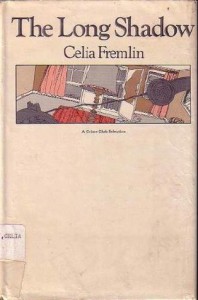Long Shadow
 British author Celia Fremlin (1914-2009) took jobs in domestic service, unusual for a middle-class woman at that time. She said it was to "observe the peculiarities of the class structure of our society," and those experiences later found their way into her later writing. Much later, in her sixties, she began to take long walks at night by herself over the back streets of London, partly for research and partly to prove a point. Her conclusion was that to make the dark streets lose their terror, "We don’t need more policemen on the beat. We need more grandmothers."
British author Celia Fremlin (1914-2009) took jobs in domestic service, unusual for a middle-class woman at that time. She said it was to "observe the peculiarities of the class structure of our society," and those experiences later found their way into her later writing. Much later, in her sixties, she began to take long walks at night by herself over the back streets of London, partly for research and partly to prove a point. Her conclusion was that to make the dark streets lose their terror, "We don’t need more policemen on the beat. We need more grandmothers." Fremlin's first mystery novel was THE HOURS BEFORE DAWN, which won the Edgar Award for Best Novel in 1958 and established her style of mystery/horror set mostly around the lives of married women in the 1950s. Some feel that THE LONG SHADOW was an equally fine work, and H.R.F. Keating even included it in his 1987 listing of the 100 best crime and mystery books.
It's the story of the Imogen Barnicott, third wife of a celebrated, cruel and egocentric professor, who, despite her unhappy marriage, had never plotted her husband's murder--yet after his supposedly accidental death, she receives a mysterious phone call accusing her of that very thing. Add to that strange happenings like new messages left lying around in his handwriting, work on an unfinished manuscript of his that continues to be written, and shadowy figures seen in the house, and Imogen not only begins to doubt her husband is dead at all, she begins to believe she just might take his place.
Fremlin's character observations manage to be cutting and yet have a touch of dark humor. Her books are filled with astute perceptions that no doubt bear the imprint of her first-hand research into human behavior. THE LONG SHADOW, THE HOURS BEFORE DAWN, and her other fiction certainly deserves a closer look.



